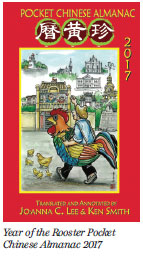

The new Museworks Books' Year of the Rooster Pocket Chinese Almanac 2017 is out and as fun as ever.
Co-translator and co-annotator Joanna C. Lee explained that the editions are adapted for the modern reader, so the entries start on Jan 1, rather than the actual first day of the Year of the Rooster (Jan 28), and extend beyond Dec 31 to Feb 16, 2018, the day the Year of the Dog begins.
Which is lucky, because, as Lee points out, the new volume includes the "hilarious" prognostication for this year's US presidential inauguration day.
The entry reads: "Big Chill Friday 20. GOOD for destroying houses, destroying walls. BAD for hairdressing, starting a business, the maiden voyage of a boat."
"We did not write it," she told China Daily. "We did not plan it. Everyone was completely in stitches when they saw that one."
Lee said friends are starting to write to her already to start planning for weddings in 2018. "I don't even have the data yet from the geomancer we work with," she said.
The geomancer - or diviner - behind Lee and co-translator and husband Ken Smith's almanac is Warwick Wong, a practicing architect who grew up in Hong Kong with a grandfather who supported the family by telling fortunes. As Wong grew older and most of his Western-leaning peers were leaving folk arts behind, Wong dove into studying ancient Chinese divination.
"He looks at the Sun, the Moon and the stars," Lee explained. "The same data people would do for the zodiac."
And there is no repetition, because there are "too many moving parts", Lee added, but there is a 60-year cycle of the "heavenly stems and the earthly stems".
"That's why a Chinese life - in the most ancient way - they say that once you reach 60, you're kind of back to starting with age one basically."
Is it a coincidence, we wondered, that the premise of the new movie The Great Wall is that mysterious creatures appear and try to overrun China every 60 years? Probably not.
Western almanacs tend to be based on astronomical data. Chinese almanacs use the same fixed data of full Moons, eclipses and equinoxes, but then add what Lee calls the other "atmospheric factors" and permutations that give nuance to the relative success or failure of activities on any given day.
"What is so fun with all of this is that people look at almanacs now, modern people, to try and look for something that is positive, that gives them some sort of positivism as to what they can do on this day, rather than what they shouldn't be doing," Lee said.
Many of the activities - rituals, digging wells, asking the gods to help beget children, acupuncture, cattle rearing - could leave modern Westerners scratching their heads.
An appendix offers what Lee calls "a modern extrapolation and interpretation of what some of these more agrarian terms could mean now."
Making fishing nets, for instance, "originally for fishermen, now applicable for modern-day capital overhauls (perhaps an upgrade on your internet browswer?)." Opening warehouses could refer to any crucial beginning that involves saving for leaner times. Going to court means any form of confrontation.
Acupuncture could apply to any medical procedure. "Days that aren't good for acupuncture, I'm not going to go for any sort of big operation," Lee said.
Geomancer Wong says in the introduction, "Modern astrology is based on concepts of time and precision that simply didn't exist in ancient China."
Wong, a University of Hong Kong educated architect who helped design Hong Kong's subway stations, calls his almanac a juncture of his Eastern and Western studies.
"Quantum physics shows that one thing can exist in two stages," he writes. "The I Ching shows that something can not only have several stages but they can happen at the same time."
Wong also thinks things have changed dramatically since the days of his grandfather's fortune-telling, when "people may have faced an uncertainty once a month."
"Today we have uncertainties every day," he said. "Back then they read the almanac to be prepared. Today, people want something to settle their minds."
The Pocket Chinese Almanac 2017 is available on Amazon.
Contact the writer at chrisdavis@chinadailyusa.com.